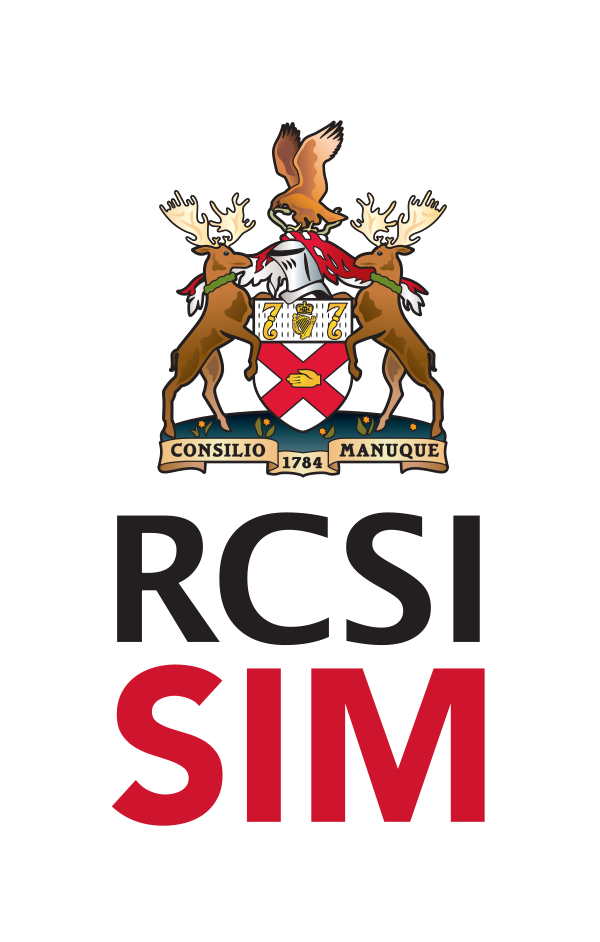Dr. Claire Condron: RCSI Profile
26/10/2023
Dr Claire Condron, Director of Simulation, recently celebrated 30 years working in RCSI. As she herself says, she effectively grew up there: “I've been really fortunate with the career that's afforded me. I've had many iterations of my job in those 30 years.” Discussing how her career has changed throughout that time, she highlights how Simulation has grown as a discipline and the state-of-the-art research and practice happening in RCSI SIM.
Condron arrived at RCSI with an undergraduate degree in Science, and began by working in the Department of Surgery in Beaumont Hospital, collaborating with surgeons-in-training. She was a research technician in Beaumont’s labs under the tutelage of Prof. David Bouchierr-Hayes, working with Prof Paul Redmond and Prof. Cathal Kelly. There, they “did all kinds of surgical research, from the effects of surgery on wound healing, infection rates, to designing better instrumentation for surgery, as well as better approaches to surgery, to yield better patient outcomes.”
This progressed to Condron’s own PhD, researching urinary infection rates in a mouse model. This was a very formative time for her, because “by virtue of the fact that I was working and managing in a lab, I was involved in many other people’s research. So I got a really good introduction to a spectrum of research, from cell biology to microbiology, right across to models.”
Simulation was a natural progression for her: she notes that while it has been billed as quite a new phenomenon, simulation has been used in education for thousands of years when it comes to role play and devices to practice safely. “In essence, what we were doing for years in Beaumont with different elements of surgery was simulation practice.” Indeed, she points out, RCSI on the Beaumont campus had the first simulated high-fidelity mannequin in Ireland: the anaesthetics department brought it in when they opened their clinical training suite in 2000. “Now, innovation has moved on, and we have quite sophisticated digitally enhanced silicone and latex and other material models that really imitate the clinical environment. We now have the opportunity to afford clinicians safe practice in many authentic settings.”
For the last three years Condron has been working in the new SIM centre on 26 York Street, right in the city centre. This space has increased capacity significantly and enabled them to build a team around their resources and equipment. Now, they have “a team of ace technical professionals that are trained right across the spectrum, from audio visual technology to moulage or making injuries, to running the mannequins and story writing.” This has allowed the college to put in a significant investment, and allowed them to create authentic learning opportunities, and research how people embed and transfer skills. They are able to do so in authentic environments, including a mock operation theatre, a mock emergency room and mock labour ward.
She points out that, while it’s one thing learning in a simulated environment, it’s also vital that these skills can be transferred into the clinical working environment. As a result, RCSI SIM has an educational research arm. They have also moved into making models for testing and designing medical devices and instrumentation, to support other RCSI colleagues: “We're able to simulate a test bed, an authentic setting, and have iterative design cycles.”
One of their overall aims is to work through the United Nations Sustainability goals. “We're very conscious of our footprints in RCSI,” she explains, “and a huge amount of animals are used in the design of medication and devices. We’re aware of the 3 Rs (Replacement, Reduction and Refinement), to reduce that number as much as possible.” If a product comes to market because it's had iterated of cycles of design, with the people that are going to use it in an authentic setting, it can potentially be brought through to market quicker and with less animal testing,
She is also very involved in RCSI’s simulated patient programme, which recently appointed a new lecturer to oversee it. It started off as a volunteer programme, she explains: “people in the community saw the merit in professionals training with real people, and they volunteered their time to present clinical cases.” The volunteers are trained to portray patients, and students work with them to practice their communication skills, from taking a medical history to breaking bad news and counselling skills. Others wear simulated devices so students can practice skills such as taking blood: getting consent, inserting the needle and reassuring the person. “The skill of taking blood is not that difficult itself,” Condron says, “but it’s much more difficult when you’ve got a nervous patient in front of you.” The programme has grown since 2012 to have 80 participants, and RCSI are able to offer a small remuneration to their volunteers.
Condron and her team’s current aim is to expand representation of the patient body to reflect Ireland today. Her colleague, Dr Claire Mulhall, recently gave a talk about increasing diversity of the simulated patient group, “to expand the nationality and race, disability and gender inclusion, all of the attributes of patients that our students will meet and work with.” That is a big, ongoing project. Relatedly, they are looking to generate authentic stories: “A lot of the scenarios or patient stories that the students work on are derived from the experiences of healthcare professionals or clinicians. We need to start to include more patient voices in the educational resources we use.”
To build on these aims, they have been working with Liz Hughes, the Head of EDI in RCSI, who sees the patient bank as a way to train and teach students to interact with a more diverse patient body. They have also received a grant from the HEA, under the gender equality fund and are partners on the LIBRA project, which provides gender equality-based leadership training to student leaders. They provide simulated scenarios that allow students to practice skills including being aware of micro aggressions, understanding unconscious bias, and learning to act or intervene as an ally.
Her work also anticipates what the future of her sector will look at: indeed, she is currently working with colleagues to build a whole new RCSI programme, much of which will focus on Simulation and new technologies She notes how excited she is about robotic surgery: the college recently acquired a robot console, and have set up a training programme for it. Currently, “there are 14 robot robots operating in Ireland, and we're now looking at the experts to report on training guidelines. It's a real disruptor in the way that surgery is going to be performed.”
In her role as Director of Simulation, then, Condron is certainly highly engaged in the running of the SIM Centre. When she finds time outside of meetings with her research group and work with her nine administrators, who coordinate the centre’s 35,000 hours of teaching and other logistics such as writing grants and papers, she is most content when in the lab, “figuring out an experiment or a sequence of experiments to deliver an answer.” When she first moved into their new buildings, she notes, “I missed the underground cavernous labs we had in Beaumont, where you could let your mind run away with experiments. So I set about quickly building the innovations lab, because I had a hankering for a space that people could create. Beforehand, it was just a store room. We’re delighted to have that lab now. I feel it’s really a home, a place I kind of gravitate towards when I have a bit of free time. We are beginning to create a critical mass of researchers interested in simulation device design and it is wonderful to see the colleagues from different department in RCSI gravitate to our lab space to try out idea’s and create a community of knowledge.”
The innovations lab is also a space where students get six-week blocks of time to work on their research projects. Condron finds she is always inspired by their ability to “invest their energy and time and create stuff in such a short space of time, so we’re delighted to have the capacity to offer them a time in our lab.” When it comes to careers in science, she highlights that “being in a creative and supportive environment is the key thing, where people are supported to follow their path.”
She acknowledges the challenges that careers in research entail: “sometimes you don't have the security in the early stages of post grad. post, doctoral piece, for a standard of living, for mortgages. But I think if you can grow in that uncertainty there are lots of opportunities.” Science, she notes, has afforded her a “wonderful career” and in RCSI she has had “many iterations of that career over time.” Condron herself still doesn’t really know what she wants be: “I’ve another 10-15 years to work, and I’m sure there’s another version of me yet to emerge.”
Dr. Claire Condron
Dr Claire Condron is the Director of Simulation at RCSI. She was a founding Senior Lecturer in Simulation-based education, and has 30 years experience in designing, delivering and evaluating teaching and learning across the healthcare professions. Claire took up a senior lectureship in Simulation in 2012 and has delivered over 6000 simulation interventions working with the schools of medicine, physiotherapy, pharmacy, PA, paramedics and postgraduate surgery. She was instrumental in establishing the Simulated Patient Programme at RCSI. She is an experienced researcher and holds a PhD in immunology.


